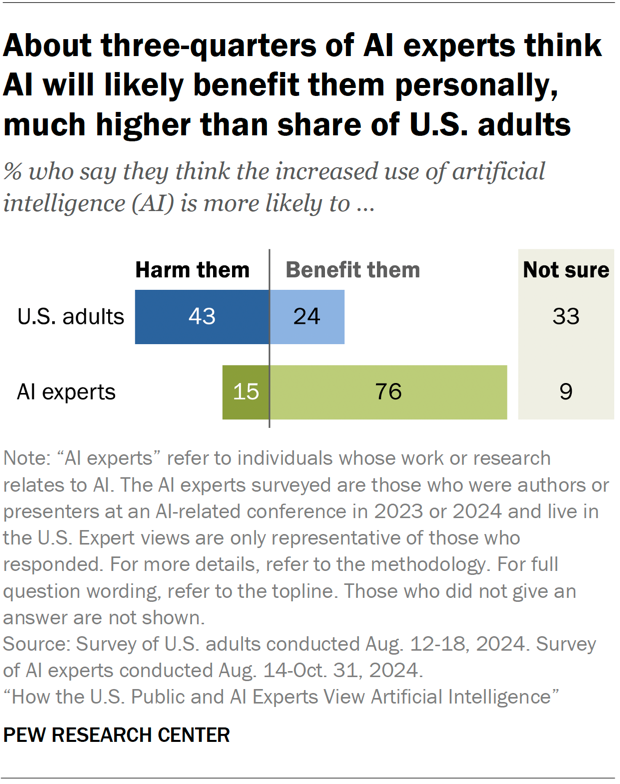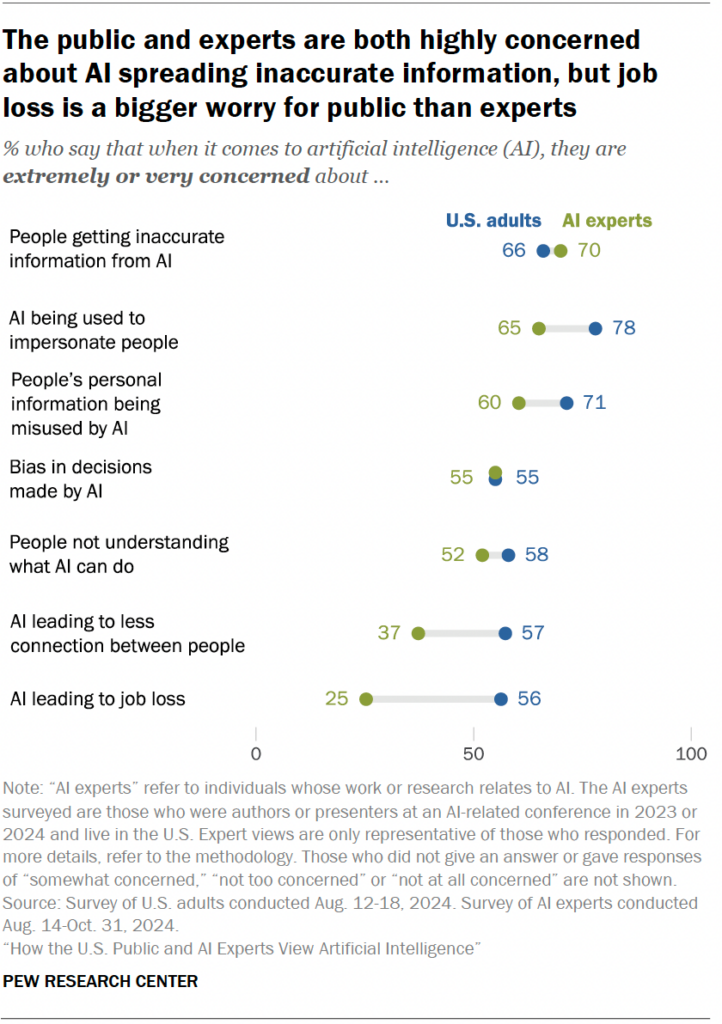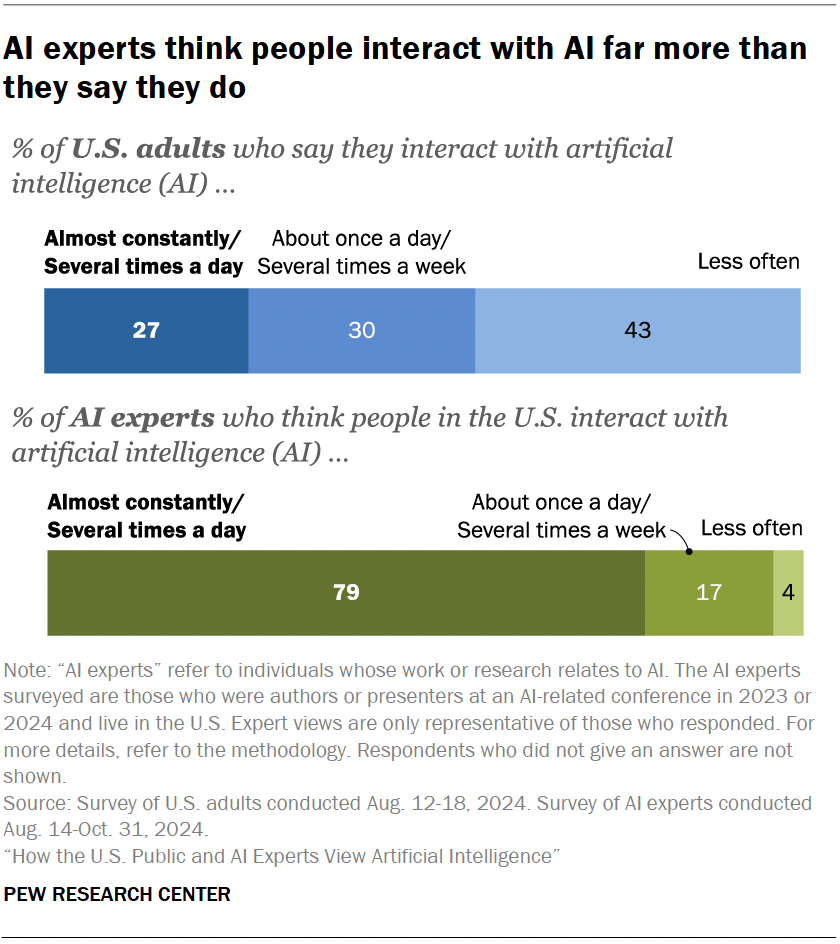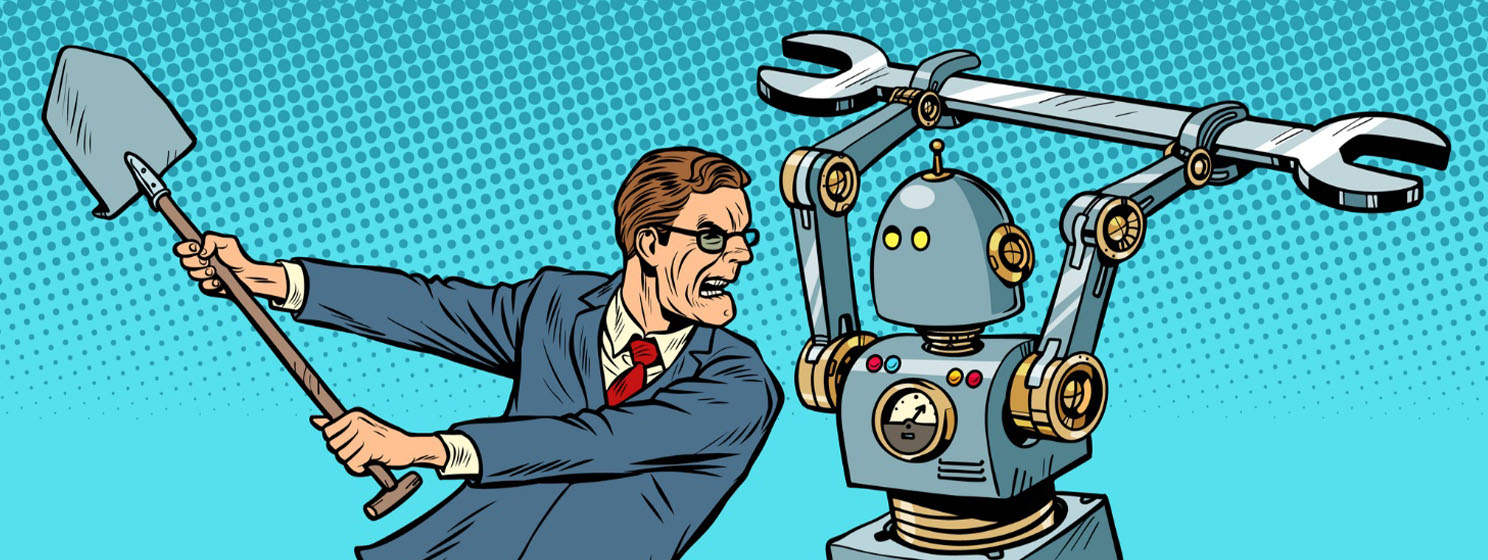|
Getting your Trinity Audio player ready...
|
Last week, the Pew Research Center released a new report titled “How the U.S. Public and AI Experts View Artificial Intelligence. “ The report surveyed 5,961 people—including AI experts and members of the general public—to better understand each group’s beliefs about artificial intelligence (AI) and usage of the technology.
As I said in the most recent Last Week in AI column, if you’ve been paying close attention to AI or you’ve been building with it, it won’t shock you that some of the responses from both groups feel out of sync with reality. But it’s not necessarily because one of these groups is wrong while the other is right, but rather, because they’re coming from a completely different vantage point.
The public sees risk; experts see opportunity
One of the biggest takeaways from the report is the difference in how AI experts and everyday people view AI’s impact.

According to the data, 43% of the general public believes AI is more likely to harm them than help them. Only 24% think it will benefit them, and the remaining 33% are unsure. Compare that to AI experts, where 76% believe AI is more likely to benefit them, and just 15% think it could harm.

This pattern continues throughout the report—AI experts are consistently more optimistic, while the general public is significantly more worried. Take job loss as an example: 64% of the general public thinks AI will lead to fewer jobs in the United States over the next 20 years, but only 39% of experts feel the same way. When asked if they were very concerned about AI-related job loss, 56% of the public said yes, and just 25% of AI experts shared that concern.

So what’s driving this gap?
The disconnect between AI users and non-users
To me, the real root of this divide seems to be experience. The more you’ve used AI systems, the less likely you will be swayed by extreme predictions. The report backs this up: 98% of AI experts reported having used a chatbot. Only 33% of the general public said the same.
On top of that, when AI experts were asked how often they think the average American interacts with AI daily, 79% guessed that people are using it “several times a day.” This highlights a large disconnect, as only 27% of the general public reported interacting with AI several times per day.

This shows that experts are making assumptions based on their routines and workflows, where AI tools like ChatGPT, Midjourney, and Claude are probably woven into their everyday lives. But for the average person, AI just doesn’t seem integral to their day in the same way.
This is where the data starts to tell a story: people who don’t use AI regularly are more likely to believe it’s a threat. And honestly, that makes sense. If your experience with AI is minimal, or worse, based on headlines and popular media, then it’s easy to imagine the worst-case scenario. You’re essentially relying on secondhand information or anecdotal experiences instead of direct engagement.
We’ve seen this before with other emerging technologies. When something new rolls out, early adopters quickly build a deep understanding of the tech through trial and error, while the average person is more likely to take a “wait and see” approach, getting their information from headlines, social media, and their personal networks while they watch from the sidelines. We saw this with blockchain, and AI is no different.
The more you use these systems, the more you learn what they can and can’t do. That’s probably why AI experts aren’t as fearful about job loss. They’ve seen the limitations up close. The general public, however, is being told that these tools are coming for everyone’s job and that robots will replace entire industries.
At the same time, though, it’s important to call out that experts might be overestimating AI’s reach and impact in the opposite direction.
In tech circles, you’re often surrounded by other builders, researchers, and enthusiasts. It becomes easy to forget that most people don’t think like you do. This creates an echo chamber, one where your optimism about AI’s capabilities starts to feel like common sense when, in reality, it’s a niche view.
The Pew data suggests that this is exactly what’s happening with AI experts. Their outlook is shaped by constant exposure to innovation and momentum, but it’s not necessarily representative of the average person’s reality.
If you’re in a community that welcomes new tech, tests new tools, and iterates fast, then AI’s potential is thrilling… but that perspective can get overstated. It can start to feel like AI is already a part of everyone’s daily life when the truth is, for many people, it’s still a mystery or even something to be afraid of.
Somewhere between the hype and the headlines
The Pew report really tells us what two very different groups think about AI. What we’re left with is a split-screen view of the future, one filled with caution and the other filled with conviction and optimism.
In reality? The truth is probably somewhere in the middle. AI will probably transform a few industries entirely…but it’s probably not going to wipe out the job market overnight. In addition, despite what the experts think, it’s not embedded into every corner of our lives yet.
That nuance is essential, especially when you consider the real-world implications. If policymakers, investors, and the public operate from different baselines of understanding, then we’ll see more misalignment, more overreactions, and more underestimations in the future.
Interestingly, the public’s hesitance might be more revealing than meets the eye. Although it’s just one dataset, the Pew report seems to support a narrative that’s been gaining traction: the narrative that AI service providers might be scaling back their data center expansion plans because the demand from the general public isn’t there yet.
In order for artificial intelligence (AI) to work right within the law and thrive in the face of growing challenges, it needs to integrate an enterprise blockchain system that ensures data input quality and ownership—allowing it to keep data safe while also guaranteeing the immutability of data. Check out CoinGeek’s coverage on this emerging tech to learn more why Enterprise blockchain will be the backbone of AI.
Watch: Transformative AI applications are coming

 03-04-2026
03-04-2026 




